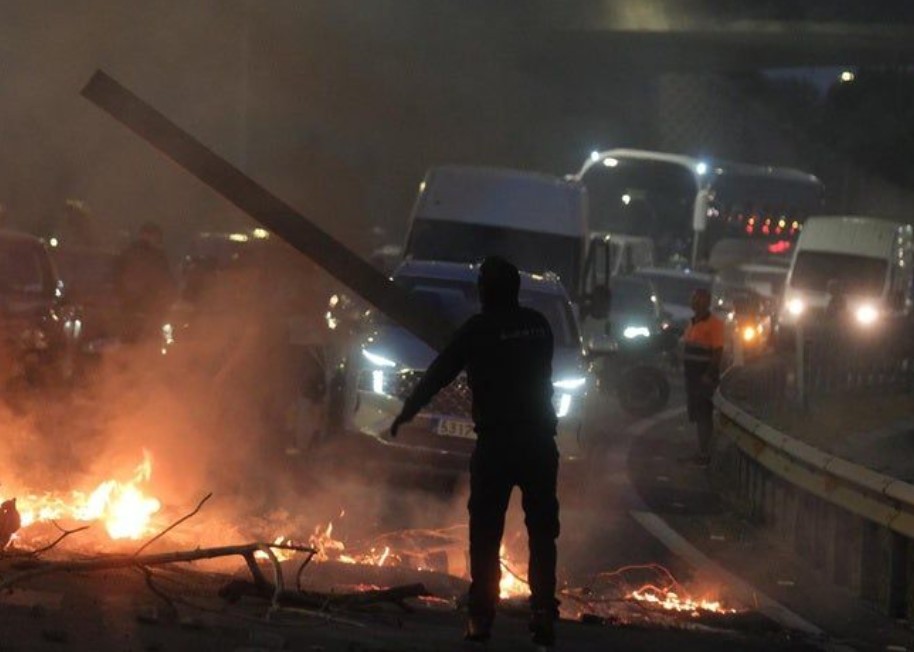The first day of the metal strike in the province of Cádiz has been marked by significant tensions, violent clashes, and massive traffic disruptions. The work stoppage in the crucial metal sector has far-reaching consequences for the infrastructure and public life in the region.
Chronology of Events: Barricade Fires and Traffic Chaos
Already in the early morning hours around 6 am, demonstrators began burning tires and other objects on the CA-3 and CA-36 roads. These actions led to extensive traffic obstructions and jams, particularly in Puerto Real, as both main traffic arteries leading out of the capital Cádiz were blocked. Traffic had to be extensively diverted towards San Fernando. In Cádiz itself, barricades were also set on fire on the industrial road leading to the important Navantia shipyard, bringing traffic in this area to a standstill.
Rail System Stalled: Impact on Train Traffic
The effects of the strike were not limited to road traffic. Rail traffic in the Bay of Cádiz was also severely affected. Adif reported that train services to and from Cádiz had to be suspended due to a fire in the immediate vicinity of the infrastructure. This affects both local trains and connections between Cádiz and Seville.
Arrests and Injuries: The Downside of Protest
During the confrontations, unfortunate incidents occurred: Four people were arrested for disturbing public order and property damage. Additionally, a woman was injured during the demonstration, further highlighting the escalation of the situation.
Expansion of Protests to Other Industrial Areas
Picket lines have been active in the main industrial areas of the Bay of Cádiz, temporarily blocking access to factories:
- In the TecnoBahía industrial park in El Puerto de Santa María, about 80 people blocked access to Airbus-CBC with palm barricades.
- In San Roque, from 6:15 am, about 200 people cut off access to the Moeve refinery via Puente Mayorga.
- In Algeciras, about 20 people conducted an informational gathering at the APM terminal.
- In Los Barrios, access to Acerinox was interrupted for 20 minutes.
Unions and Employers: Negotiations at a Deadlock
Union representatives, including Antonio Montoro of UGT and Pedro Lloret of CCOO, described the continuation of the strike as “successful” this morning. They accused employers of taking an “inflexible” stance that prevented an agreement on the collective bargaining agreement. According to the unions, this stance led to the strike call for some 30,000 workers in the metal sector in the province of Cádiz. Montoro stated that Femca had “laughed at the workers” with their proposal and emphasized that “this must be stopped definitively” and “we must look for alternatives to this employer.” He suggested that “this agreement should never be negotiated again.”
Key Negotiation Points: Wages, Temporary Employment, and Allowances
Employees in the metal auxiliary sector began the strike after failed negotiations with the Federation of Metal Employers of the Province of Cádiz (Femca) within the extrajudicial system for resolving labor conflicts in Andalusia (Sercla). The strikes could be extended indefinitely from Monday, June 23, if no agreement is reached by then.
Femca’s latest proposal included a wage increase of 3% in 2024 (with arrears paid) and 2.8% in 2025, with a commitment to update annual wages in line with the CPI until 2030. Other points included an indefinite extension of the agreement if not terminated, as well as subsidies for the previous Christmas, improvements in allowances, study grants, and complete work equipment.
The unions rejected these proposals, considering the conditions for permanent employment, a new entry-level contract with lower wage conditions, and the restriction of the toxicity and hardship allowance to companies with more than 100 employees as unacceptable.
This current strike takes place three and a half years after a high-profile strike in the metal sector in Cádiz in November 2021, which led to the signing of the previous agreement.




